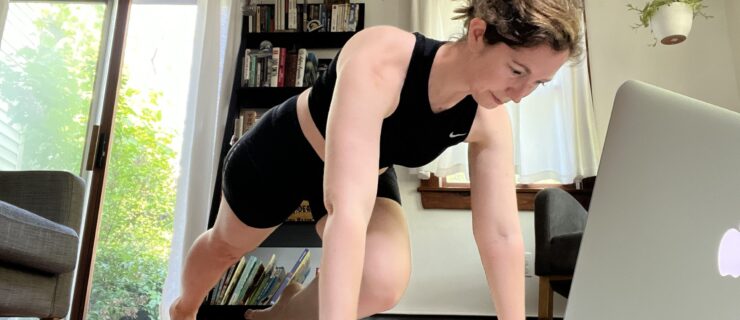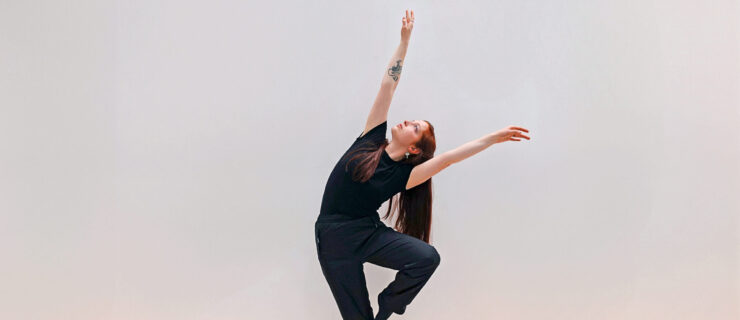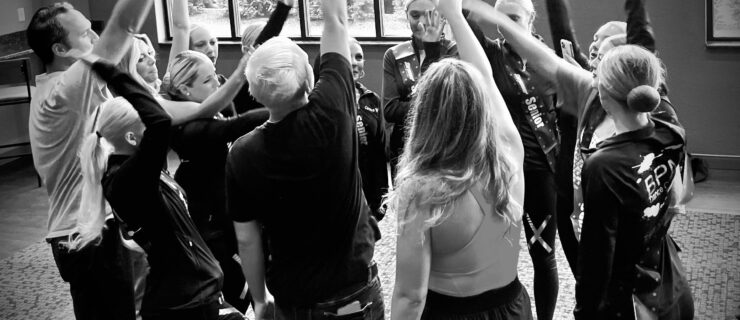Former "DWTS" Pro Chelsie Hightower on How Her Anxiety Affected Her Dance Career
From competing on “So You Think You Can Dance” to performing on “Dancing with the Stars” for seven seasons (and earning an Emmy nomination for her work on the latter), Chelsie Hightower has lived the pro dance dream. Though Hightower retired from “DWTS” several years ago and now teaches and choreographs in her home state of Utah, she admits that her dance career exceeded even her own high expectations. “I’ve accomplished things that I didn’t know were possible,” she says.
But most fans of “DWTS” would never have guessed that while filming, the talented and seemingly fearless ballroom pro was facing her fiercest competitor off-camera. Hightower has struggled with anxiety for most of her life, but the issue became especially severe during her years on the show.
With the help of therapy and other coping exercises, Hightower has found healthy ways to manage her anxiety. Now, she hopes that sharing her experience will inspire other dancers struggling with mental illness to get help.
When did you first start noticing your anxiety?
I had terrible performance anxiety when I was competing in ballroom as a kid. I’d be up all night before certain competitions because I was so anxious about the next day. I also struggled with social anxiety. Then, when I moved to L.A. and began performing on “Dancing with the Stars,” it hit me really hard. But until I started going to therapy, I didn’t recognize what those feelings even were. Until then, I had no idea what was going on. It was just mental chaos, and it was terrifying and isolating because I felt like no one else could understand what I was feeling.
Can you tell us about your anxiety during your time on “DWTS”?
When I moved to L.A. at 19, I felt like I really had a handle on things. Then, within the first few days of moving, I started feeling the anxiety return. I remember thinking, “Oh my gosh, this can’t be coming back. This can’t happen again.” It hit me when I wasn’t expecting it, and there was this panic that I hadn’t felt before.
Those first couple of weeks in L.A., I couldn’t eat or sleep. I tried to find someone who could help me understand what was going on. I spoke to a counselor who said she thought I was experiencing situational anxiety. But I was young and couldn’t accept that reality at that time. I told myself these thoughts were a challenge I had to learn to overcome by myself.
Over the next five years, I dealt with anxiety on and off. There were times within that period when it got so bad I’d just look forward to the end of the day so I could go to sleep and not feel things. After my five-year run on “DWTS,” I finally moved home and started seeing a therapist and getting the help I needed to manage those feelings.
How did your anxiety affect your dancing?
It was exhausting. It’s hard to stay motivated and push through the pressure of dancing on national TV when you’re not OK on the inside. I kind of turned into a machine—I wouldn’t allow myself to feel too much because I feared my anxiety would come back.
What have you found are the best ways to cope with anxiety?
I’m the biggest proponent of therapy. I love it. It’s helped me work through a lot, especially things that might trigger those thoughts and feelings. I also use visualization techniques to push through my anxiety. Sometimes I’ll imagine a lasso and I’ll wrap all my thoughts up in the lasso and then I’ll see myself throw away the lasso, so all of those thoughts get smaller and smaller, until they’re out of sight.
Relaxation is another coping technique that helps. As dancers we can get so caught up with constantly working towards something. But sometimes I’ll just sit on my couch and put my phone away and enjoy the moment. Being able to release your mind and get to a place where you’re not having to think too hard or worry is really important.
What are misconceptions people have about anxiety?
Something to be aware of is that anxiety is never won and done. It’s something you figure out how to manage on a daily basis. As you get stronger, you can get to a point where you overcome it in certain settings or circumstances, but there are a lot of things that can bring it back.
What advice do you have for young dancers who might be dealing with anxiety?
Don’t let it stop you from doing what you want to do. The road might be a little bit harder, but it’s going to be worth it. The dance world forces you to address those feelings of fear and insecurity head on—it’s a world full of judgment and competition. But once you learn to cope with those feelings, your struggle will make you stronger. In an atmosphere where people can crumble easily because of the pressure, you can potentially be the strongest person in the room.



